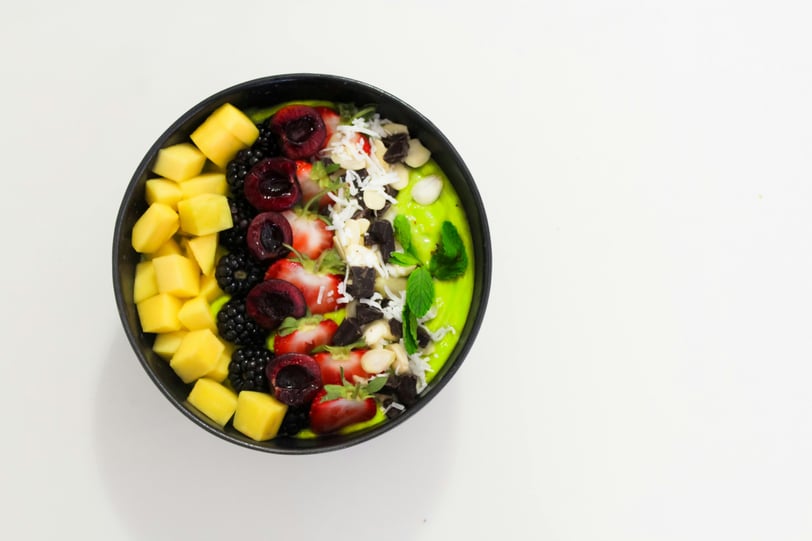The Cortisol Diet: Foods to Reduce Stress and Belly Fat


We all know stress can make us feel overwhelmed, but did you know that stress can also be a significant roadblock in your weight loss journey? Specifically, stress triggers the release of cortisol, a hormone that can increase belly fat and make it harder to lose weight. High cortisol levels can lead to cravings for unhealthy foods, poor sleep, and a slowed metabolism. If you’ve been struggling to lose belly fat despite your best efforts, your cortisol levels could be a key factor.
The good news? By adjusting your diet to include certain stress-busting foods, you can help lower cortisol levels, reduce stress, and tackle belly fat. Here’s how to work with your body and fight belly fat by eating the right foods!
What is Cortisol and How Does It Affect Weight Loss?
Cortisol is often called the "stress hormone" because it’s released by the adrenal glands in response to stress. It plays a key role in helping your body manage stress, but when cortisol levels remain elevated for prolonged periods, it can trigger various physical changes, including:
Increased abdominal fat storage
Increased appetite and cravings, particularly for sugary, high-fat foods
Disrupted sleep patterns, leading to fatigue and poor decision-making
Slowed metabolism
High cortisol levels, particularly chronic stress, can make it difficult to lose weight, especially around the belly area. This is where the cortisol diet comes in.
Foods That Help Lower Cortisol and Reduce Belly Fat
If you want to reduce stress and shed belly fat, choosing the right foods can help balance your cortisol levels and keep cravings in check. Let’s explore the foods that can help you take control of your cortisol and work toward a flatter stomach.
1. Omega-3 Rich Foods: Fight Inflammation and Reduce Stress
Omega-3 fatty acids, found in foods like salmon, walnuts, and flaxseeds, are known for their anti-inflammatory properties. Chronic stress leads to inflammation in the body, and omega-3s can help reduce this, ultimately lowering cortisol levels and improving your overall mood.
How to Add Omega-3s to Your Diet:
Enjoy a serving of salmon or mackerel a few times a week.
Snack on a small handful of walnuts or chia seeds.
Add flaxseeds to smoothies or sprinkle them over your yogurt.
2. Vitamin C-Rich Foods: Natural Stress Reducers
Vitamin C is known for its immune-boosting benefits, but it also plays a role in lowering cortisol levels. Studies have shown that consuming foods rich in vitamin C can help reduce cortisol in response to stress. Plus, vitamin C-rich foods are often low in calories, making them great for weight loss.
How to Add Vitamin C to Your Diet:
Add oranges, grapefruits, or kiwi to your morning routine.
Snack on bell peppers, broccoli, or strawberries.
Drink fresh lemon water or enjoy a cup of green tea.
3. Whole Grains: Keep Your Blood Sugar Stable
Whole grains, such as quinoa, brown rice, and oats, help regulate blood sugar levels, which can prevent spikes in cortisol. When blood sugar dips, your body can produce more cortisol to stabilize it. By eating whole grains, you’ll promote a steady flow of energy and lower stress hormones.
How to Add Whole Grains to Your Diet:
Start your day with a bowl of oatmeal or whole grain toast.
Enjoy a hearty salad with quinoa or brown rice for lunch.
Swap out white pasta for whole wheat pasta or spelt noodles.
4. Dark Chocolate: A Sweet Way to Combat Stress
Good news! Dark chocolate is not only delicious but can also help reduce cortisol levels. It contains flavonoids, which are known to reduce stress and improve mood. Just be mindful to enjoy it in moderation, as too much sugar can have the opposite effect.
How to Add Dark Chocolate to Your Diet:
Indulge in a small piece of dark chocolate (70% cocoa or higher) as a treat.
Add dark chocolate shavings to your smoothies or oatmeal.
Pair a square of chocolate with a handful of almonds for a satisfying snack.
5. Lean Protein: Stabilize Blood Sugar and Maintain Muscle
Protein is essential for balancing blood sugar and reducing cortisol. Lean sources of protein, like chicken, turkey, tofu, and legumes, help maintain muscle mass, curb hunger, and stabilize energy levels, preventing stress-induced overeating.
How to Add Lean Protein to Your Diet:
Grill or bake chicken, turkey, or fish for a protein-packed dinner.
Add tofu or tempeh to stir-fries or salads.
Enjoy a hard-boiled egg as a snack or add beans to your salads.
6. Magnesium-Rich Foods: Relax Your Mind and Body
Magnesium is a mineral that plays a crucial role in relaxation. It helps regulate cortisol levels and supports restful sleep. Magnesium-rich foods can also reduce muscle tension and help you unwind, preventing stress from negatively impacting your weight loss goals.
How to Add Magnesium to Your Diet:
Snack on pumpkin seeds, almonds, or cashews.
Add spinach or kale to smoothies or salads.
Try a serving of black beans or avocado for a magnesium boost.
7. Probiotic-Rich Foods: Support Gut Health and Reduce Stress
The gut-brain connection is real! Your gut health affects your stress levels, and consuming probiotic-rich foods can help balance your gut microbiome, reducing stress and boosting mood. Yogurt, kefir, sauerkraut, and kimchi are all excellent sources of probiotics.
How to Add Probiotics to Your Diet:
Start your day with a bowl of Greek yogurt topped with fruit and seeds.
Add kimchi or sauerkraut to your salads or sandwiches.
Drink kefir or enjoy kombucha as a refreshing beverage.
8. Hydration: Drink Water to Keep Stress in Check
Dehydration can lead to higher cortisol levels, making stress feel more intense. Drinking plenty of water throughout the day can keep your cortisol levels in check, help regulate appetite, and promote overall well-being.
How to Stay Hydrated:
Carry a water bottle with you and aim to drink 8-10 cups of water a day.
Add a slice of lemon or cucumber to your water for a refreshing twist.
Drink herbal teas like chamomile or peppermint, which are naturally calming.
9. Herbal Teas: Natural Relaxants to Ease Stress
Certain herbal teas, such as chamomile, lavender, and ashwagandha, are known for their calming effects. Drinking these teas can help reduce cortisol and promote relaxation before bedtime, leading to better sleep and less stress.
How to Add Herbal Teas to Your Diet:
Sip on chamomile tea before bed to help relax and wind down.
Drink lavender tea or lemon balm tea to reduce anxiety during stressful days.
Try ashwagandha tea to help manage stress naturally.
Conclusion:
While stress is a natural part of life, chronic stress doesn’t have to sabotage your weight loss goals. By focusing on a diet rich in anti-inflammatory omega-3s, stress-reducing vitamin C, calming magnesium, and gut-friendly probiotics, you can balance your cortisol levels and fight belly fat naturally.
Want to Transform Your Body in Just 21 Days?
What if you could lose weight, feel more energized, and enjoy delicious smoothies every day? The Smoothie Diet gives you a simple, step-by-step plan to help you shed pounds, boost your energy, and feel incredible, all in just 21 days.
✨ Click Here to Discover The Smoothie Diet
Your transformation starts today!


